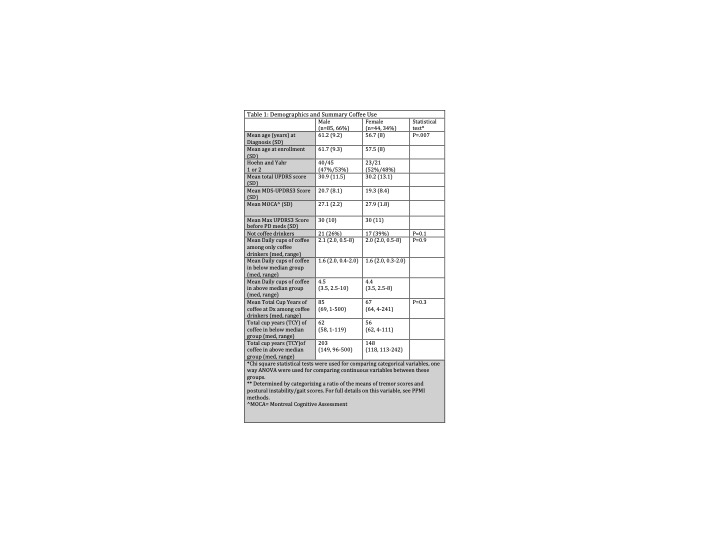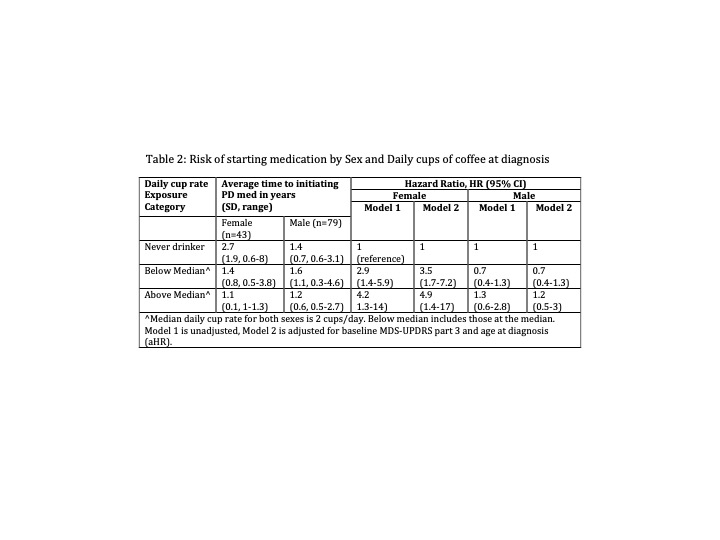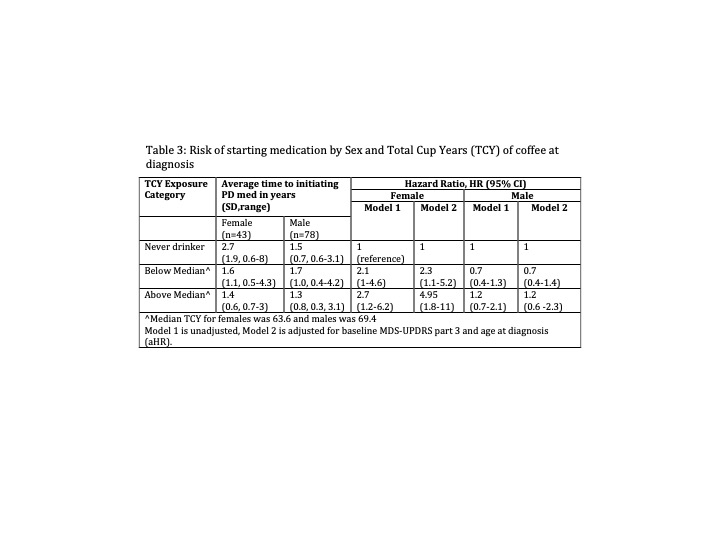Category: Epidemiology
Objective: Investigate how coffee use prior to PD diagnosis affects medication initiation in PD.
Background: Population studies show a decreased incidence of PD for men with high coffee intake1, but not women2. Studies are inconsistent as to whether caffeine is beneficial3,4 or detrimental to motor outcomes in PD5,6.
Method: Participants of the Parkinson’s Progression Marker Initiative (PPMI) – a prospective, observational study that follows people with PD from diagnosis – completed a survey on lifelong coffee drinking. We measured coffee use as cups/day at diagnosis, and cumulative cup-years prior to diagnosis and stratified this as never, below median, or above median coffee drinkers. Cox proportional hazard models, adjusted for PD diagnosis age and baseline MDS-UPDRS3, and were used to determine the association between coffee use and time to starting symptomatic therapy. Outcome data was censored at 5 years from baseline.
Results: 129 participants completed the survey; men and women were similar, except women were younger at PD diagnosis [Table1]. In women, compared to nondrinkers, coffee drinkers had a shorter time to starting PD treatment, a pattern more marked in higher coffee drinkers when measured in cups/day (below median use vs no use: aHR 3.5 [95% CI 1.7-7.2]; above median use vs no use: aHR 4.9 [1.4-4.7]) and in total cup-years (below median use vs no use: aHR: 2.3 [1.1-5.2]; above median use vs no use: aHR 4.9 [1.8-11]) [Table2,Table3]. There were no significant differences among men.
Conclusion: In this early PD cohort, higher coffee use at time of diagnosis (cups/day) and cumulative use prior to diagnosis (cup-years) was associated with a shorter time to medication initiation in women but not men. In population studies examining PD incidence, coffee use has been associated with lower risk of PD in men, but in post-menopausal women, estrogen use may modulate this assoication7,8,9,10. A similar interaction between sex hormones and caffeine use may explain the more rapid progression identified here. Better understanding of how sex relates to determinants of PD progression is critical for accurate prognosis and clinical trial design.
References: References
1. Ross GW, Abbott RD, Petrovitch H, et al. Association of coffee and caffeine intake with the risk of Parkinson disease. JAMA. 2000;283(20):2674-2679. doi:10.1001/jama.283.20.2674
2. Ascherio A, Zhang SM, Hernán MA, et al. Prospective study of caffeine consumption and risk of Parkinson’s disease in men and women. Ann Neurol. 2001;50(1):56-63. doi:10.1002/ana.1052
3. Moccia M, Erro R, Picillo M, et al. Caffeine consumption and the 4-year progression of de novo Parkinson’s disease. Parkinsonism Relat Disord. 2016;32:116-119. doi:10.1016/j.parkreldis.2016.08.005
4. Wills AMA, Eberly S, Tennis M, et al. Caffeine consumption and risk of dyskinesia in CALM-PD. Mov Disord. 2013;28(3):380-383. doi:10.1002/mds.25319
5. Simon DK, Wu C, Tilley BC, et al. Caffeine, creatine, GRIN2A and Parkinson’s disease progression. J Neurol Sci. 2017;375:355-359. doi:10.1016/j.jns.2017.02.032
6. Palacios N, Gao X, McCullough ML, et al. Caffeine and risk of Parkinson’s disease in a large cohort of men and women. Mov Disord. 2012;27(10):1276-1282. doi:10.1002/mds.25076
7. Ascherio A, Weisskopf MG, O’Reilly EJ, et al. Coffee consumption, gender, and Parkinson’s disease mortality in the cancer prevention study II cohort: the modifying effects of estrogen. Am J Epidemiol. 2004;160(10):977-984. doi:10.1093/aje/kwh312
8. Patwardhan RV, Desmond PV, Johnson RF, Schenker S. Impaired elimination of caffeine by oral contraceptive steroids. J Lab Clin Med. 1980;95(4):603-608.
9. Pollock BG, Wylie M, Stack JA, et al. Inhibition of caffeine metabolism by estrogen replacement therapy in postmenopausal women. J Clin Pharmacol. 1999;39(9):936-940. doi:10.1177/00912709922008560
10. Ascherio A, Chen H, Schwarzschild MA, Zhang SM, Colditz GA, Speizer FE. Caffeine, postmenopausal estrogen, and risk of Parkinson’s disease. Neurology. 2003;60(5):790-795. doi:10.1212/01.wnl.0000046523.05125.87
To cite this abstract in AMA style:
K. Wong, E. Brown, C. Meng, C. Tanner. Women with Parkinson’s Disease (PD) and High Coffee Use Have a Shorter Time to Medication Initiation [abstract]. Mov Disord. 2022; 37 (suppl 2). https://www.mdsabstracts.org/abstract/women-with-parkinsons-disease-pd-and-high-coffee-use-have-a-shorter-time-to-medication-initiation/. Accessed February 6, 2026.« Back to 2022 International Congress
MDS Abstracts - https://www.mdsabstracts.org/abstract/women-with-parkinsons-disease-pd-and-high-coffee-use-have-a-shorter-time-to-medication-initiation/



